 With the Taliban showcasing great ‘tenacity‘ and ability to recruit new members from around the region to replace those lost, one must conclude that the Afghan government and its International supporters are in a fight for their lives. Hard decisions will have to made for them to win, including the eradication of the nation's poppy crops and growers. Last week, I quickly mentioned this article, ‘Is Afghanistan a Narco-State?,’ by Thomas Schweich, a top US drug official in Afghanistan for several years.
With the Taliban showcasing great ‘tenacity‘ and ability to recruit new members from around the region to replace those lost, one must conclude that the Afghan government and its International supporters are in a fight for their lives. Hard decisions will have to made for them to win, including the eradication of the nation's poppy crops and growers. Last week, I quickly mentioned this article, ‘Is Afghanistan a Narco-State?,’ by Thomas Schweich, a top US drug official in Afghanistan for several years.
Schweich brings three main points to the plate in the article; 1. Karzai and the Kabul government lack the political will to stop poppy production and in fact many major growers of the crop form their powerbase 2. the insurgency is unlikely to end as long as the Taliban can support themselves with the drug money 3. the 'starving farmer’ is a myth, as most poppy growers are already rich and just using the lack of government and ISAF pressure to continue this lucrative practice.
Schweich catalogs the various times Karzai and his other corrupt police and ministry officials have downplayed the importance of poppy eradication, emphasizing that it would just hurt the poor citizens of his country. Citing a United Nations Office on Drugs and Crime report, Schweich rejected the idea that farmers would starve without the poppy. For Schweich the 'starving farmer’ myth allowed…
'some European governments to avoid involvement with the anti-drug effort. Many of these countries had only one or two year legislative mandates to be in Afghanistan, so they wanted to avoid any uptick in violence that would most likely result from an aggressive strategy, even if the strategy wold result in long-term success. The myth gave military officers {US} a reason to stay out of the drug war, while prominent Democrats used the myth to attack Bush administration policies. And the Taliban loved it because their propaganda campaign consisted of trotting out farmers whose fields had been eradicated and having them say that they were going to starve.’
Schweich is especially hard on Karzai, claiming he's only doing what's best for his political survival and not the country, and the Pentagon, who he portrays as not wanting any part of the drug eradication business as it is not part of their mission of defeating the Taliban. But Schweich is correct, as Karzai and NATO forces cannot separate the poppy cartel from their efforts of governance and battle against the Taliban. The poppy's are a crystal clear example of the weakness of the Afghan government, the law does not apply to the growers apparently and this undermines all other laws, and the Taliban need financing and sympathy wherever they can get it and the poppy fields provide both. This situation is very complicated and a lot can go wrong. Here are Schweich's recommendations: In parantheses (hardest word to spell in the world) will be my comments and questions.
I am sympathetic to Schweich is all out eradication of poppies and corrupt war lords and officials, but this effort could have major blowback. Barnett R. Rubin, Director of Studies and a Senior Fellow at New York University's Center on International Cooperation and the author of The Fragmentation of Afghanistan, warns ‘Crop eradication puts more money in the hands of traffickers and corrupt officials by raising prices and drives farmers toward insurgents and warlords.’ But the alternatives are not pretty either. The Afghan government needs to gain legitimacy and halting this illicit activity, which appears to mainly benefit the Taliban and already rich growers, can go a long way in extending its reach in the south and showing its citizens that breaking the Afghan government law will beget punishments. A strong move against corruption and illicit activity could help begin the creation of a culture of lawfulness in the state, a place where the average person believes that their life would be better off following the rule of law than breaking it or letting others break it. A difficult issue to say the least, what do you think?
(Photo Source: New York Times)